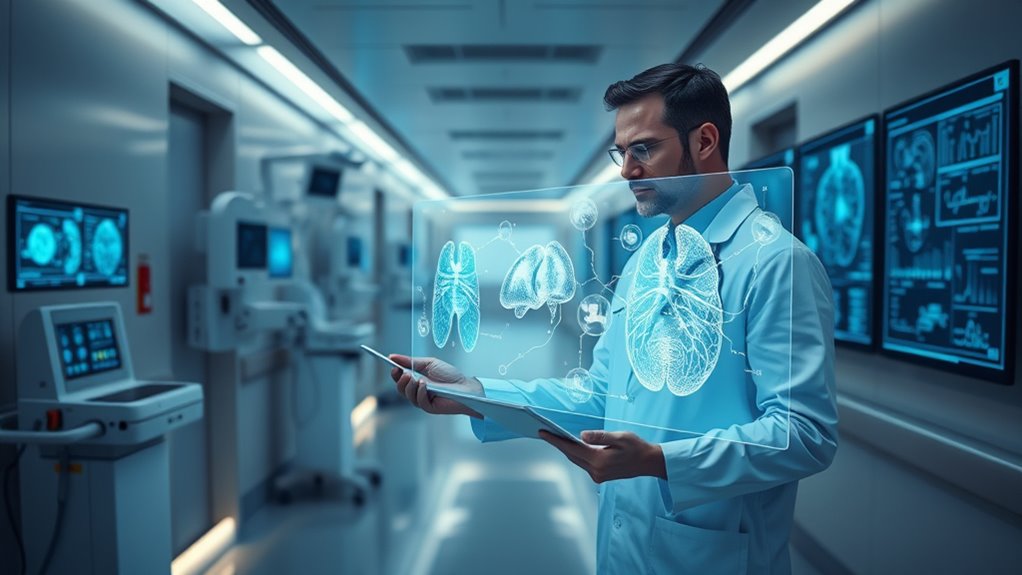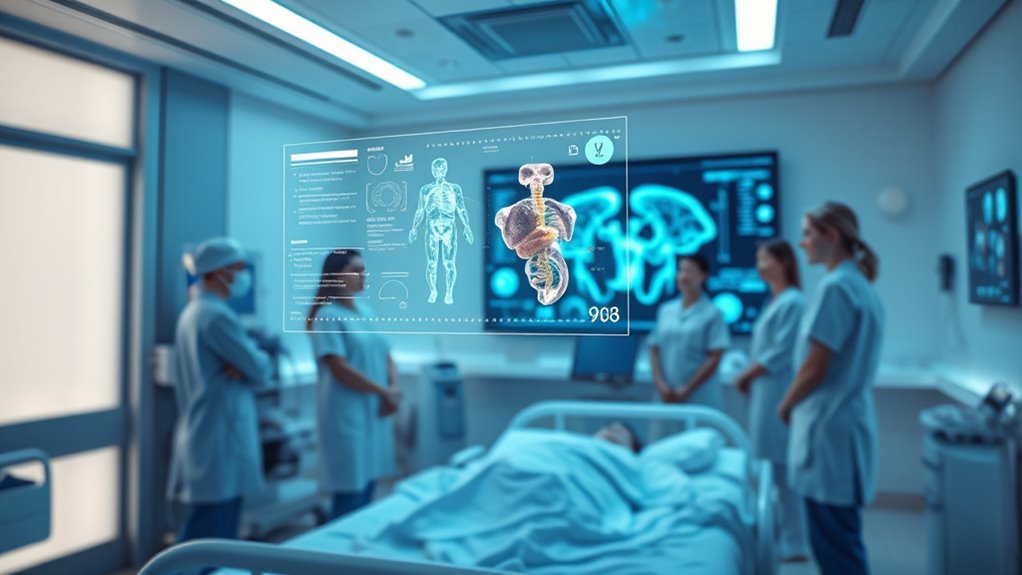Generative AI is truly transforming healthcare by improving diagnostic accuracy, speeding up disease detection, and personalizing treatments to suit individual patients. It helps you interpret complex data, discover new disease markers, and develop innovative therapies faster. By tailoring interventions based on genetic and lifestyle information, it makes treatments safer and more effective. If you’re curious about how this technology goes beyond the hype, there’s more to uncover about its powerful impact on the future of healthcare.
Key Takeaways
- Generative AI enhances diagnostic accuracy by interpreting complex medical data rapidly and supporting early disease detection.
- It enables personalized treatment plans by analyzing genetic and lifestyle data, improving patient outcomes.
- Generative AI accelerates research by discovering new disease markers and facilitating innovative therapy development.
- It helps create more precise, less invasive treatments, reducing risks and improving safety for patients.
- Integrating generative AI into healthcare workflows promotes comprehensive, individualized patient care and ongoing medical advancements.

Beyond diagnostics, AI plays a vital role in advancing personalized medicine. Instead of offering one-size-fits-all treatments, healthcare providers now leverage AI to tailor therapies to individual patients. By analyzing genetic information, lifestyle data, and medical histories, AI models help identify the most effective interventions unique to each person. This approach minimizes adverse effects and maximizes therapeutic benefits, making treatments more efficient and less invasive. For you, this means a move toward healthcare that considers your specific biology and circumstances, ultimately leading to more precise and effective care. Additionally, AI’s capacity for rapid data analysis enables researchers to uncover new disease markers and develop innovative therapies more quickly.
Frequently Asked Questions
How Does Generative AI Ensure Patient Data Privacy?
You can trust that generative AI safeguards patient data privacy through data encryption, which secures information during storage and transmission. Additionally, it uses robust consent management systems, ensuring patients control when and how their data is used. These measures help prevent unauthorized access and maintain confidentiality, giving you confidence that your sensitive health information stays protected while still enabling AI to assist in healthcare improvements.
What Are the Limitations of AI in Clinical Decision-Making?
You might find that AI in clinical decision-making faces limitations like algorithm bias, which can skew results and impact patient care. Additionally, interpretability challenges make it hard for you to fully understand how the AI reaches its conclusions. These issues can reduce trust and accuracy, meaning you should use AI as a tool alongside your expertise, rather than relying on it entirely for critical decisions.
How Is AI Integrated Into Existing Healthcare Workflows?
You integrate AI into healthcare workflows by focusing on medical record integration and clinical workflow automation. You connect AI tools with electronic health records, enabling seamless data sharing and real-time updates. Automation streamlines routine tasks like appointment scheduling and documentation, freeing staff for more critical patient care. You also guarantee AI supports decision-making without disrupting existing processes, making workflows more efficient while maintaining accuracy and compliance.
What Are the Costs Associated With Implementing Generative AI?
Implementing generative AI can feel like funding a spaceship to the moon! You’ll face costs like technology investment, staff training, and infrastructure upgrades. A thorough cost analysis helps identify hidden expenses, while understanding implementation challenges—like data security and integration hurdles—prevents surprises. While initial expenses are high, the long-term benefits can outweigh the costs, especially if you plan carefully and allocate resources wisely.
How Do Regulators Oversee AI Applications in Healthcare?
Regulators oversee AI applications in healthcare by establishing clear guidelines that address regulatory challenges and ethical considerations. You’ll find agencies like the FDA evaluating safety, efficacy, and data privacy before approving AI tools. They monitor ongoing performance, enforce compliance, and update regulations to keep pace with technology. This oversight aims to guarantee AI benefits patients while safeguarding against risks, making ethical use and transparency top priorities.
Conclusion
As you step into the future of healthcare, generative AI acts like a guiding star, illuminating new paths and possibilities. It’s not just a fleeting spark of hype but a steady flame that can transform patient care and medical research. Embrace this powerful tool, and you’ll find yourself riding the wave of innovation, turning what once seemed like distant dreams into tangible realities. The journey ahead is bright—ready to explore?









